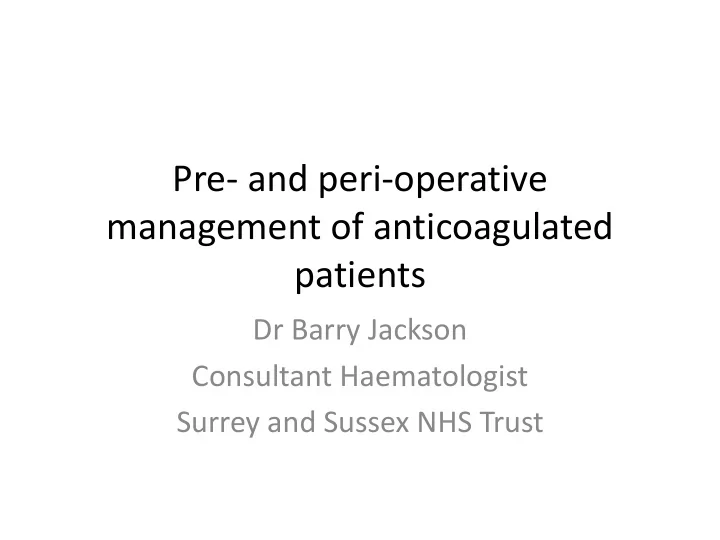

Pre- and peri-operative management of anticoagulated patients Dr Barry Jackson Consultant Haematologist Surrey and Sussex NHS Trust
• Elective surgery – Warfarin – DOACs • Emergency surgery – Warfarin – DOACs • Antiplatelet therapy
Elective Surgery • British Society of Haematology Guidelines – Guidelines on oral anti-coagulation 4 th ed 2011 – Peri-operative anticoagulation Oct 2016
Warfarin • Does warfarin need to be stopped? – Major surgery No Is the patient having:- Refer for bridging Joint and soft tissue aspiration and injections – Low risk procedures Cataract surgery Upper endoscopy or colonoscopy (+/- biopsy only) Inferior alveolar nerve block Consultant decision that procedure planned does not require stopping warfarin (please indicate below) ……………………………………………………………. Yes INR < 2.5 – continue current dose of warfarin Check INR 7-14 days prior to procedure INR > 2.5 stop warfarin for 2 days Check INR on day of procedure prior to surgery If INR < 2.5 continue If INR 2.5-3.0 If INR > 3.0, defer with procedure discuss with surgeon patient and discuss with haematologist Post procedure Restart patients usual maintenance warfarin dose 6-8 hours post procedure when haemostasis secured Ensure patient has INR check approx 7-10 days post procedure and dose accordingly Dental Procedures (including extractions) The risk of significant bleeding from dental procedures on oral anticoagulation is very small and, therefore, if the INR is stable between 2-4 there is no need to discontinue anticoagulation. Risk of bleeding can be minimised using 5% tranexamic mouthwash QDS for 2 days If an inferior alveolar nerve block is required follow above guidance
Stopping warfarin • When to stop • When to restart • Bridging
Stopping warfarin • Half-life 36 hours • Stop 5 days prior to surgery • Ideally check INR 24 hours prior to surgery, allows time to give vitamin K if INR >1.5 • Check INR on day of surgery
Bridging • Is the risk of thrombosis sufficiently high when warfarin is temporarily stopped to warrant treatment dose LMWH? • Check renal function
Bridging • VTE • Atrial Fibrillation • Mechanical Heart Valves
Bridging • VTE – Highest risk in first 3 months and especially first month (?delay elective surgery) • Atrial Fibrillation • Mechanical Heart Valves
Bridging • VTE – Highest risk in first 3 months and especially first month (?delay elective surgery) • Atrial Fibrillation – CHADS 2 score – Bridging Required if score 5-6 – TIA/CVA in past 3 months • Mechanical Heart Valves
Bridging • VTE – Highest risk in first 3 months and especially first month (?delay elective surgery) • Atrial Fibrillation – CHADS2 score – Bridging Required if 5-6 – TIA/CVA in past 3 months • Mechanical Heart Valves – All valves aside from bileaflet aortic valves
Bridging
DOACs Renal function Estimated half-life Low bleeding risk High bleeding risk (CrCl, ml/min) (h) (h) (h) Dabigatran ≥80 13 24 48 ≥50 to <80 15 24 – 48 48 – 72 ≥30 to <50 18 48 – 72 96 Rivaroxaban ≥30 9 24 48 <30 48 72 Apixaban ≥30 8 24 48 <30 48 72 Edoxaban ≥30 10 – 14 24 48 <30 48 72
DOACs Renal function Estimated half-life Low bleeding risk High bleeding risk (CrCl, ml/min) (h) (h) (h) Dabigatran ≥80 13 24 48 ≥50 to <80 15 24 – 48 48 – 72 ≥30 to <50 18 48 – 72 96 Rivaroxaban ≥30 9 24 48 <30 48 72 Apixaban ≥30 8 24 48 <30 48 72 Edoxaban ≥30 10 – 14 24 48 <30 48 72
DOACs Renal function Estimated half-life Low bleeding risk High bleeding risk (CrCl, ml/min) (h) (h) (h) Dabigatran ≥80 13 24 48 ≥50 to <80 15 24 – 48 48 – 72 ≥30 to <50 18 48 – 72 96 Rivaroxaban ≥30 9 24 48 <30 48 72 Apixaban ≥30 8 24 48 <30 48 72 Edoxaban ≥30 10 – 14 24 48 <30 48 72
• Elective surgery – Warfarin – DOACs • Emergency surgery – Warfarin – DOACs
Emergency surgery • Reversal of warfarin – Withholding – Vitamin K • Expect to start reversing warfarin 4-6 hours after administration – Prothrombin Complex Concentrate (Beriplex) • Full immediate reversal • Give 5mg Vitamin K alongside • Dose dependent on INR and weight • Recheck INR 30 mins after administration – ?FFP
Emergency surgery • DOACs – Can surgery be safely delayed? – When did they take their last DOAC • Dabigatran – Praxbind • Rivaroxaban, Edoxaban, Apixaban – No antidote – Consider PCC (or aPCC)
Antiplatelet therapy • Elective surgery – When being used for secondary prevention, aspirin monotherapy can be discontinued for most invasive non-cardiac procedures, but if the perceived bleeding risk is high, aspirin can omitted from day -3 to day +7 – If on dual antiplatelet therapy, low bleeding risk procedures should proceed without interruption and high bleeding risk procedures patients should continue aspirin and stop clopidogrel 5 days preop
Antiplatelet therapy • Emergency surgery – High-bleeding risk surgery • Consider pre-op iv tranexamic acid • Benefit of platelets pre-op uncertain • If excessive peri- or post-op bleeding consider 2 pools of platelets
Summary • Robust pre-operative assessment of all patients on anticoagulation • For those patients on DOACs, delay emergency surgery if possible and not detrimental to patients health until reversal of anti-coagulation is achieved • Further information – www.b-s-h.org.uk/guidelines
Recommend
More recommend